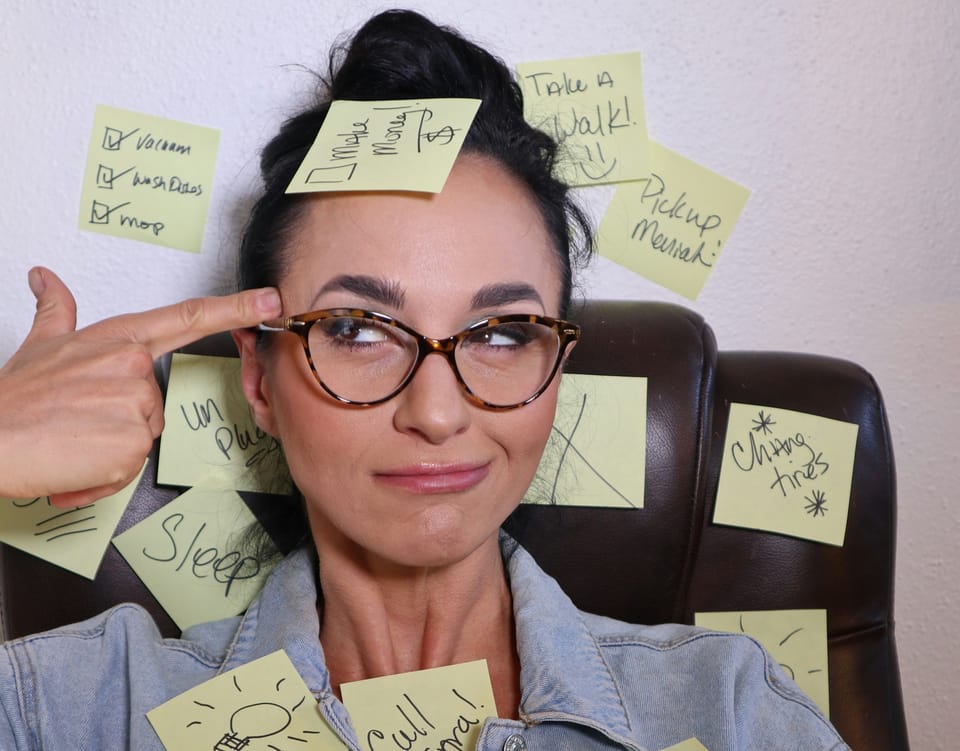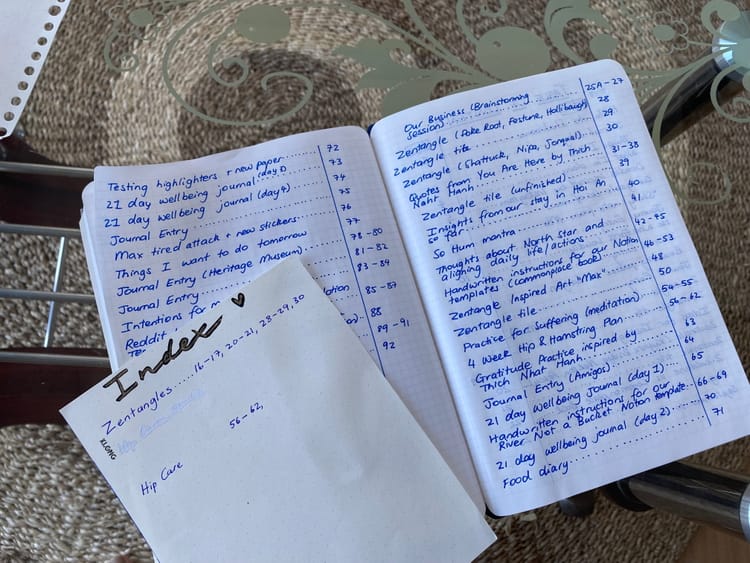The Real Reason I Never Had Enough Time

Originally posted on Quirky Rants.
I am constantly struggling to get things done. Running this way and that yet getting nowhere.
At the end of the day I feel like a failure.
I thought the problem was a lack of time. If only I could find more time, I could do so much more. I could succeed.
After fruitlessly trying to squeeze everything into my day, I realized that I was approaching it all wrong.
The solution was not to try to do more.
The solution was todo less. To let go of things and let what truly matters emerge. Then, do that with focus and without guilt.
I know this sounds counter-intuitive, but stay with me.
In this story, I share how I came to this realization — from my failed attempts at time-blocking to find more time in my day, to my epiphany that I need to let go of things, and how to do that without too much pain.
How it started: trying to find more time
My (mis)adventures started from a place of stress, guilt and frustration. I had too many things to do and too little time to do them in.
A quick search on Reddit reassured me that this was not just a me problem. And the most common solution suggested?
Time blocking.
The idea of time blocking is that you divide your day into specific blocks of time, allocating each block to the tasks you want to get done. This way, in theory at least, you can fit more things into your day and so get more things done.
This would be my salvation! After all, it seemed to be working for so many people. People who seemed to be able to fit everything they wanted to get done into their day with this one magical, super effective strategy.
I tried and failed at time blocking
I tried many different approaches for time blocking.
First, I took the most obvious, direct route. I got a notebook and divided each day of the week into hours.
What happened?
I either forgot to check what to do next, didn’t have my notebook with me, or I simply didn’t have the willpower and energy to do that activity. Or, something else came up that needed attention.
Next, I decided to go digital.
I thought I knew the issue: my physical notebook was usually closed, sitting on my desk, so I never remembered to check it. I needed something more accessible. Something I had with me most of the day and could quickly open to see what was next on my schedule.
Enter Google Calendar.
I meticulously scheduled my days on Google Calendar, from the time I would wake up to the time I would go to bed.
I even set up reminders for the tasks. They came up at the most inconvenient times — when I was in the middle of something — and felt like an interruption. I ended up swiping them away, feeling a little pang of guilt each time.
The hour-by-hour breakdown felt too restrictive and inflexible.
Despite stubbornly trying different variations of time blocking and task scheduling, convincing myself thatthistime it will work because of some small tweak, I never got the life-changing results everyone online talked about. I simply could not get it to work for me.
And that’s when I realized something stupidly simple. Something I had somehow overlooked — or more truthfully, ignored, because I did not like the solution.
We cannot create more time
We all have 24 hours in the day. We cannot create more time, no matter which tips, tricks or methods we adopt.
Yes, we can be more ‘efficient’ in how we spend our time. We can cram it full of tasks and to-dos. We can schedule and streamline activities to get the most number of productive hours possible from a day.
But that’s not how I want to live. With a schedule filled right down to the minute.
The only way to have more time is to fill your day with less things to do.
Let me say that again, the only way to have more time is to not do things. Because after all, time is the currency we spend on doing things.
Time blocking is like adding more things to an overfull plate. That’s not what I needed.
Instead, I removed stuff from my plate, creating space for the yummy things that I really love. The things that feed my soul.
You cannot do everything
I really did not want this to be the solution. I wanted to do all the things. No, Ineededto. I had myself convinced.
But I could not ignore this reality: I cannot do everything.
It is simply impossible to fit everything we want to do, everything we believe we should do, everything we feel we have to do, and everything we are expected to do into 24 hours.
Here are some of the things I wanted to do (caution long list incoming ⚠️):
- Exercise. This one alone is a big one. I wanted to do cardio, mobility training, yoga, strength training, qi gong. Unrealistic much?
- Nutrition: eating clean, plant-based whole foods. Organic where possible.
- Make my own pasta sauces.
- Write down my recipes.
- Update and maintain my blog.
- Learn German
- Learn to draw
- Colour
- Master DaVinci Resolve
- Journal
- Meditate
- Spend more time with my family
- Write
- Read
- Create social media content
- Play Sins of a Solar Empire, Stellaris, Warcraft, and all the other games I’ve been wanting to play more.
- Learn to ride a bicycle (yes, I don’t know how to ride a bicycle. Oh, the shame)
- Visit my brother and spend time cuddling my niece.
The list goes on and on.
There is no way I could fit all this into my day. Not without obsessive scheduling and running on fumes.
I needed to cut things out.
You don’t need to do anything
When I started to look at each thing I wanted to do and examine it more closely, I realized that I don’t need to do any of these things. They were not necessary. Not required. Not mandatory.
You might be thinking, well that’s all well and good, the things on your list look like optional extras. What about things that I have to do? I have to work, pay my bills and mortgage, sleep, shower, and all the essentials for survival.
This might sound harsh, but I’ll say it:
You don’t have to do anything.
The truth is that we always have options and we are always weighing up the pros and cons of all the options, often subconsciously. When we don’t like the consequences of a particular option, we write it off completely and no longer see it as an option.
Even if an option has undesirable consequences, it is still an option.
When someone says they have only one option, they’re really saying, “I have no choice,” and you know that’s wrong. At the very least, add “do nothing” and “go insane” as options. — Derek Sivers, Hell Yeah Or No: What’s Worth Doing
How to truly let go
Okay, so now I knew that I didn’t necessarily have to do everything. But how to decide which things to do and which to let go?
Here, I stumbled upon another counter-intuitive idea that I’d like to share with you.
Don’t try to figure out what you want to do and eliminate the rest.
Identify the things you don’t need to do and let what resonates emerge.
I began to ask myself questions like:
- Do I really need to do this?
- Why do I want to do this?
- What would happen if I didn’t do it?
I discovered that I don’t need to do most of things I had been trying to fit into my days.
So I let them go.
Now, don’t let me fool you into believing it’s as easy as that. Letting go was incredibly difficult, and I haven’t mastered it just yet.
To some extent, my identity, my dreams were tied to these things.
I imagined that I would one day be fit, strong and sculpted, like those I saw on Instagram. One day, when I finally started doing the workouts I had been saving. I would do it when I had time, in some distance future, and then I would achieve this goal. It was so hard to let it go — not just push it down the track for future me to get to, but truly let it go. A part of my imagined future self went with it.
But every time I eliminated something, letting go of all the expectations and tasks tied to it, I felt a little lighter. My soul a little freer.
We are trained to see letting go of things as an act of giving up — a defeat. It’s not a defeat.
It’s a victory each time you find something you can truly let go of and eliminate from your mental burden. By doing so, you’ve created more time and space in your life. Where you can rest and recover.
Time and space from which can emerge clarity of what you really want to do.
To quote my new favorite author, Derek Sivers, again:
Say no to almost everything. This starts to free your time and mind. Then, when you find something you’re actually excited about, you’ll have the space in your life to give it your full attention. — Derek Sivers, Hell Yeah Or No: What’s Worth Doing
Go forth and do those things.
